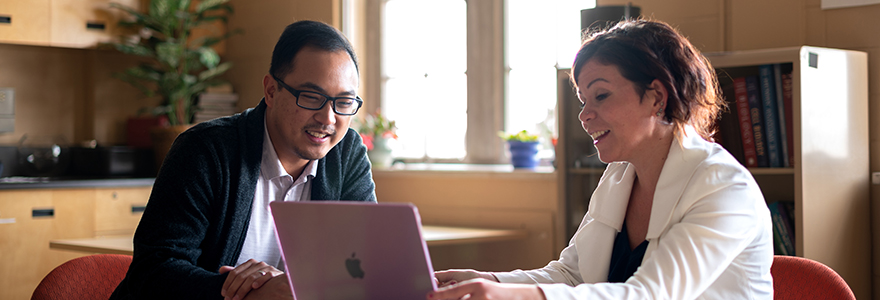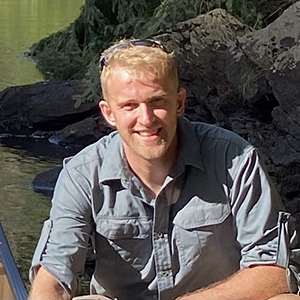App helps create strong bonds between students and community
 John David (Jedd) Sardido, Experiential Learning Coordinator, and Dr. Sarah McLean, Director, Schulich Education Enhancement Division (SEED), review the Get Connected app.
John David (Jedd) Sardido, Experiential Learning Coordinator, and Dr. Sarah McLean, Director, Schulich Education Enhancement Division (SEED), review the Get Connected app.
By Communications
Bachelor of Medical Sciences (BMSc) students at Schulich Medicine & Dentistry are piloting a new way to gain important skills outside of the classroom while helping meet the needs of volunteer organizations in London and surrounding region.
Through an online platform called Get Connected, students are matched to career-relevant volunteer opportunities offered by local community organizations.
A series of educational modules provides an overview of the volunteer landscape in London, the city’s particular needs and the available opportunities. Once signed in to the app, students receive alerts about volunteer needs in the community, and can follow up with the ones of interest to them.
The app has benefits for these future health-care leaders, who may not know the volunteer opportunities in the city.
 Jenna Yuen, lecturer in the Department of Anatomy & Cell Biology
Jenna Yuen, lecturer in the Department of Anatomy & Cell Biology
“Students who aren’t from London who want to get involved in volunteering maybe don't know where to start,” said John David (Jedd) Sardido, Experiential Learning Coordinator, who has coordinated the development and introduction of the app. “This opens the doors to many opportunities in the city.”
Test run
As a test run, the app was introduced in September to the more than 800 third and fourth-year Bachelor of Medical Sciences (BMSc) students. Approximately 100 students signed up to be part of the program. Right now, the participants are being onboarded to the app as more community partners are being recruited. Going forward, the team is looking at expanding the rollout to graduate and professional students.
Local organizations Youth Opportunities Unlimited, Habitat for Humanity and London Food Bank are among those providing the volunteer opportunities. These not-for-profit organizations have been very responsive, said Sardido.
“Many of the leaders of these organizations are also leaders in the community,” he said. “It’s an opportunity for students to connect with these phenomenal, passionate people who are making a difference in our city.”
Building skills
“We envision students gaining more knowledge and becoming more civically minded about the issues within our local community,” said Dr. Sarah McLean, Associate Professor, Department of Anatomy & Cell Biology and Director, Schulich Education Enhancement Division (SEED). “And we’ve already seen a great desire among students to be part of this.”
Engaging with community organizations not only enables students to see the practical value of their education, it gives them valuable experience for their future plans.
 Jordan Cote, fourth-year BMSc student
Jordan Cote, fourth-year BMSc student
“Employers, graduate, and professional schools look for applicants who exemplify skills and competencies gained outside of the classroom,” said Jordan Cote, a fourth-year BMSc student, who worked on the educational modules and has already signed up for the program. “Volunteering helps students develop these competencies through real-world experiences while helping community organizations achieve their missions.”
The modules, built with input from community partners, help students identify the benefits gained from the experience, said McLean.
Jenna Yuen, a lecturer in the Department of Anatomy & Cell Biology and team leader, said the modules will also help students discover the great work being done in the community.
“My team and I found that while there were eye-opening statistics being published - and great hands-on work being done by our community partners - this information was not readily available to students,” she said. “We addressed this issue by creating engaging and informative content. We know it will help educate and inspire students to take action within our community."
The Get Connected initiative is the starting point for the Medical Sciences Community Outreach (MaSCOt) program, an initiative that helps future health care leaders understand the significance and impact of current public health challenges facing the city and region.
“When I engage students in these opportunities, it really opens their eyes to what is out there, and how their skills can translate to real value in the community,” McLean said. “They see the value of their degree, and it really helps create those connections between Schulich and the community that I think will benefit us both.”









